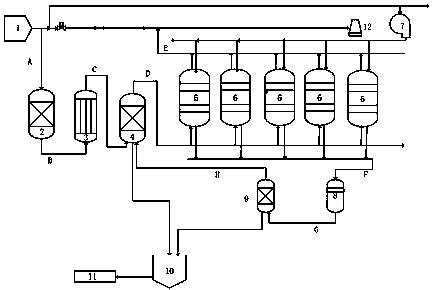Low-temperature desulfurization and denitrification method for pelletizing exhaust gas
A technology for desulfurization and denitrification and flue gas, which is applied in the field of pellet flue gas desulfurization and denitrification, which can solve the problems of high operating cost and secondary pollution
- Summary
- Abstract
- Description
- Claims
- Application Information
AI Technical Summary
Problems solved by technology
Method used
Image
Examples
Embodiment 1
[0050] 160,000 cubic meters of flue gas at 240°C, with a nitrogen oxide content of 500mg / m 3 , the sulfide content is 200 mg / m 3 , the flue gas enters the denitrification tower, and at 240°C, under the action of the ZSM-5 molecular sieve catalyst, the nitrogen oxides are reduced to nitrogen, and the flue gas after the reaction enters the waste heat pellets to generate steam, and the flue gas temperature drops to about 180°C; then The flue gas enters the self-heat exchanger and exchanges heat with the cold flue gas entering the chimney, and the temperature drops to about 110°C; the flue gas at 110°C is cooled to 50°C by spraying, and the spraying water is recycled, and part of the waste water is neutralized , to the biochemical system; the cooled flue gas passes through the demisting equipment and enters the adsorption tower; three 200m 3 The adsorption tower, two open and one standby, each adsorption tower is filled with 120m 3 Microcrystalline material, total 360 m 3 Micro...
Embodiment 2
[0052] The specific implementation is as attached figure 1 The shown device flow, 150,000 cubic meters of flue gas at 260°C, the nitrogen oxide content is 400mg / m 3 , the sulfide content is 100 mg / m 3 , the flue gas enters the denitrification tower, at 240°C, under the action of ZSM-5 molecular sieve catalyst, the nitrogen oxides are reduced to nitrogen, and the flue gas after the reaction enters the waste heat pellets to generate 150°C steam, and the flue gas temperature drops to about 140°C ;Then the flue gas enters the spray and cools down to 40°C, the spray water is recycled, and part of the wastewater is neutralized, and then goes to the biochemical system; the cooled flue gas passes through the demisting equipment and enters the adsorption tower; three 200m 3 The adsorption tower, two open and one standby, each adsorption tower is filled with 120m 3 Microcrystalline material, total 360 m 3 Microcrystalline material ZSM-5 molecular sieve; the specification of the adsor...
Embodiment 3
[0054] The specific implementation is as attached figure 1 The device process shown, 140,000 cubic meters of flue gas at 300°C, the nitrogen oxide content is 450mg / m 3 , the sulfide content is 200 mg / m 3 , the flue gas enters the denitrification tower, at 300°C, under the action of the copper-supported ZSM-5 molecular sieve catalyst, the nitrogen oxides are reduced to nitrogen, and the flue gas after the reaction enters the waste heat pellets to generate steam at 160°C, and the flue gas enters the automatic The heat exchanger exchanges heat with the cold flue gas entering the chimney, and the temperature is reduced to about 110°C; the temperature of the flue gas at 110°C is reduced to about 110°C through the flue gas; The spraying water is recycled, part of the waste water is neutralized, and goes to the biochemical system; the cooled flue gas passes through the demisting equipment and enters the adsorption tower; three 200m 3 The adsorption tower, two open and one standby, ...
PUM
 Login to View More
Login to View More Abstract
Description
Claims
Application Information
 Login to View More
Login to View More - R&D Engineer
- R&D Manager
- IP Professional
- Industry Leading Data Capabilities
- Powerful AI technology
- Patent DNA Extraction
Browse by: Latest US Patents, China's latest patents, Technical Efficacy Thesaurus, Application Domain, Technology Topic, Popular Technical Reports.
© 2024 PatSnap. All rights reserved.Legal|Privacy policy|Modern Slavery Act Transparency Statement|Sitemap|About US| Contact US: help@patsnap.com








